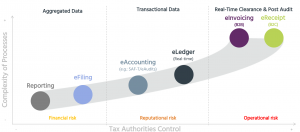This blog was last updated on March 11, 2019
After initially focusing on data and automation to gain visibility and ensure tax compliance in business-to-business transactions, many governments are now extending technology into business-to-consumer trade, requiring eReceipts. So, what’s the story behind eReceipts, and why do they matter? Here’s a quick tutorial to get you up to speed.
What are eReceipts?
eReceipts are the next logical evolution in technology-enabled tax compliance being adopted in Latin America and Europe. The first phases – eFiling, eAccounting, eLedger and eInvoicing – focused primarily on business-to-business transactions. eReceipts turn the focus to consumer purchases, tracking point-of-sale transactions in real-time for tax reporting purposes.
Why are more countries requiring eReceipts?
eReceipts are increasing in popularity among governments and businesses alike for a number of reasons. Since retail businesses often rely on cash, sales can be hard to track, which lends itself to tax evasion. Traditionally, governments didn’t have visibility into the flow of B2C transactions. However, with eReceipts, governments have real-time access to transaction-level detail. They are therefore able to maximize VAT collections on all B2C sales. eReceipts complement other technology-enabled compliance initiatives, ensuring proper tax collections and providing full lifecycle visibility into indirect tax. With eReceipts, governments gain visibility throughout the supply chain – from raw materials to final product and on to the final consumer.
Businesses also benefit from eReceipts. They drive greater efficiencies, cut down on paper costs, streamline accounting processes and provide better data records.
Where are eReceipts required?
Many countries in Latin America have implemented eReceipts. They are currently mandated in Brazil, Peru and Uruguay, and while no mandate exists in Chile, eReceipts have been widely adopted there. In fact, Chile now issues electronic VAT assessments based on collected eInvoice and eReceipt data. This helps eliminate fraud since all tax payments and credits are calculated on legally registered invoices/receipts in the government servers.
How do eReceipts work?
Brazil was an early pioneer of tracking B2C transactions, first requiring government-approved fiscal printers at every retail location and now moving to NFCe (eReceipts) to reduce the hardware and maintenance expenses of the fiscal printers. Countries throughout Latin America are now adopting Brazil’s model, which designates the final consumer on receipts for improved tracking.
In Europe, the Czech Republic is also an eReceipt model that other countries are watching closely. Every cash transaction (including cards and checks) is recorded in a central data repository managed by the tax authority, and then a unique confirmation code is immediately sent back and added to the receipt. This electronic record makes it possible for the government to recognize fraudulent activities and improve audit efficiencies.
Because of both the volume and the multitude of methods in which consumers can purchase goods, eReceipts pose a significant business challenge.
Take Action
To learn more about the constantly changing tax compliance landscape and how eReceipts could impact your business, download the white paper: The Evolution of Value-Added Tax Compliance and Reporting.
